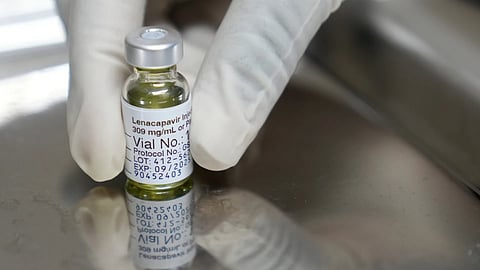

NEW DELHI: In a major step forward in the fight against HIV/AIDS, the US Food and Drug Administration (FDA) has approved Lenacapavir, an injectable HIV drug. This drug protects people for six months with each shot. Now, the Science journal has hailed the drug for its remarkable effectiveness in eliminating HIV infections, dubbing it the 'breakthrough of the year.'
The publication emphasised that this groundbreaking development represents a critical advancement in the fight against HIV/AIDS and marks a significant step forward in the ongoing efforts to mitigate the impact of this global health crisis.
Many HIV/AIDS researchers are now hopeful that the drug, lenacapavir, will powerfully drive down global infection rates when used as pre-exposure prophylaxis (PrEP), the journal said.
"It has the potential if we can do it right, which means going big and getting it out there," says Linda-Gail Bekker, an infectious disease specialist at the University of Cape Town, who led one of the two efficacy trials for the drug's maker, Gilead Sciences, a California-based pharma company.
Despite decades of progress, HIV continues to pose a challenge to global public health as it continues to infect more than one million people a year.
LEN, an HIV-1 capsid inhibitor delivered by subcutaneous injection twice a year, was shown to be highly effective in preventing HIV among cisgender men, transgender men, transgender women, and gender non-binary individuals who have sex with partners assigned to males at birth.
The increasing optimism about combating HIV/AIDS followed after two groundbreaking clinical trial results for lenacapavir. The trials showed it to be capable of virtually eliminating new HIV infections through sex.
"A large efficacy trial in African adolescent girls and young women reported in June that these shots reduced HIV infections to zero—an astonishing 100% efficacy. Any doubts about the finding disappeared three months later when a similar trial, conducted across four continents, reported 99.9% efficacy in gender-diverse people who have sex with men," the journal said.
Whether lenacapavir PrEP will become widely used and speed the end of the HIV/AIDS epidemic depends on access, delivery, and, of course, demand, it added.
Regulatory approval isn't expected until the middle of 2025.
"Although injectable lenacapavir may not be enough to achieve the goals set by UNAIDS, it holds the potential to protect millions from infection. It is a potent addition to the series of spectacular biomedical breakthroughs that—as they reach the people who need them most—are steadily moving HIV/AIDS away from being a disease that upends entire communities and turning it into a rare malady," it added.
According to the World Health Organisation (WHO), the results from two drug trials "provide compelling evidence for the potential of LEN to transform HIV prevention globally, across diverse populations. It is important to note that oral PrEP is safe and effective in preventing HIV when taken as indicated. LEN's twice-yearly dosing offers a significant advantage for people who face challenges with adhering to daily oral PrEP, including stigma and discrimination, pill fatigue, and challenges with consistent access to medication."